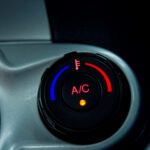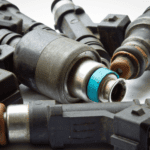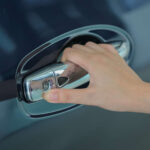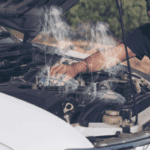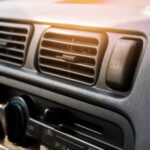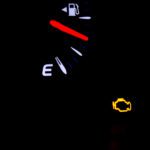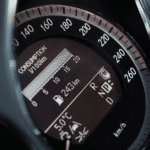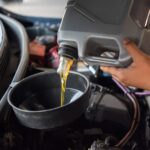Diesel engines give a darker-colored smoke to petrol engines, which is just burning diesel. However, I’m sure you’ve seen big clouds of thick black smoke coming from the back of a diesel-engined car as it accelerates down the road. Well, this is not good, and there are so many different causes of this problem; below in this article are the most common causes I’ve come across of black smoke coming from a diesel engine when accelerating.
What Causes Black Smoke From Diesel Engines?
Regardless of what causes the black smoke from a diesel engine, there is one of two reasons: an insufficient air supply to the engine. Or the engine is over fuelling, resulting in incomplete combustion. Both will cause large amounts of black smoke from the exhaust when accelerating. There are several causes for this happening. Some are more common than others:
Clogged air filter
The air filter collects dirt and dust particles from the air before it enters the engine for combustion.
A clogged air filter can cause excess black smoke from a diesel engine because it restricts airflow to the engine. Not enough air in the engine means the air-fuel mixture will be imbalanced, extra fuel will be burnt, and black smoke will come from the car.
Regularly changing or cleaning the air filter will prevent this type of problem from happening alongside others, such as a clogged throttle body.
Faulty injectors
Fuel injectors deliver the diesel into the engine at a specific rate and spray pattern. Cars ECU and the throttle input by the driver control fuel injectors.
However, if an injector goes faulty, it can deliver too much fuel to the engine, which will cause an excess cloud of black smoke when accelerating. If an injector becomes defective because it is clogged, it can’t deliver fuel efficiently (incorrect spray pattern), causing over-fueling and incomplete combustion. This, alongside other issues such as the engine jerking and hesitating, will cause excess black smoke from the exhaust.
Inspecting fuel injectors usually requires hooking the car up to a diagnostic machine and driving the car while looking at live data. Injectors can usually be ultrasonically cleaned and don’t always require replacing. Using good quality diesel fuel and, on occasion, a fuel additive can also help clear and prevent blockages on the tip of the injector.
Failed turbocharger
Most modern diesel engines require a turbocharger as they lack acceleration without one. A turbocharger increases the air by using exhaust gasses to spin the turbine and suck more air into the engine, resulting in increased power and fuel efficiency.
If the turbocharger is not operating correctly because it has failed or is damaged, it may not be able to provide the necessary boost pressure, leading to insufficient air supply. This causes a problem because the car thinks it’s getting X amount of air, so it injects the fuel required, but because it only receives Y amount of air, it has over-fueled, and the excess diesel burns off as thick black smoke comes out of the exhaust.
A failed turbocharger causing black smoke is especially noticeable under hard acceleration. The usual causes for a turbocharger to fail are a blocked oil return feed, failed turbo seal, cracked turbo housing, and failed bearings. You can usually spot when a turbo has failed just by looking at it; you might see thick black oil leaking. You may also find oil has collected in the intercooler.
Blocked dpf
A diesel particulate filter (DPF) works similarly to a catalytic converter but uniquely for diesel engines only. They are designed to capture and remove soot particles from the exhaust gasses of a diesel engine.
If the DPF becomes blocked, it can’t effectively filter the exhaust gas, releasing soot particles and black smoke emissions. DPFs are self-cleaning and work by regenerating, which means they burn off the soot and harmful particles that collect in the DPF when it gets to temperature.
A typical cause for DPF failing to regenerate is lots of stop-and-start driving. Eventually, the DPF will get so blocked that it won’t be able to self-clean. Most cars have a DPF warning light, so you can expect that to come on. You may still be able to encourage it to clean with a good DPF fuel treatment and drive the car as the vehicle manufacturer recommends to promote regeneration. Each vehicle has its specific requirements to get the DPF to regenerate. If that doesn’t work, replacing the DPF may be the only way to stop the excess black smoke.
Defective fuel pressure regulator
A diesel fuel pressure regulator regulates the amount of fuel that enters the engine via the injectors. They keep the power under a specific pressure ensuring constant supply even if the demand for fuel increases, i.e., during acceleration.
If the pressure regulator becomes defective or clogged, it may not be able to regulate the fuel flow properly. A loss or increase in fuel pressure will result in a varying amount of fuel being burnt in the engine, which means a lot of black smoke will come from the exhaust under acceleration.
Incorrect engine timing
Engine timing refers to the precise coordination of the engine’s fuel injection and combustion events. The engine timing is kept correct by the cambelt or chain.
If the timing is incorrect, the fuel may not be injected optimally. This will result in incomplete combustion, which will mean not enough fuel (diesel) has burnt and is now forced into the exhaust, where it may ignite if the exhaust is hot enough. This will produce black smoke.
You can destroy an engine if the timing is incorrect, so adjusting it should only be done if you have the correct tools and understanding of how the timing operates.
Worn piston rings
Piston rings seal the pistons inside the engine cylinder while also allowing the piston to move up and down during combustion. When the engine is running, they are lubricated by the engine oil, which also aids in sealing.
If the piston rings break engine oil into the combustion chamber, it will burn and release smoke. Usually, you can expect to see a blue tint to the excess smoke coming out of the exhaust. A common reason for piston rings to break is they have become dry from running the car low on engine oil.
Fixing piston rings requires removing the head from the engine, so it should be carried by qualified mechanics who know where they are going. Special tools are needed for this type of job, so it is one of the few I don’t recommend you undertake at home on the drive.
Faulty O2 sensor
The O2 sensors are either side of the catalytic converter or diesel particulate filter (DPF for short), which work by detecting the amount of oxygen in the exhaust gases. Combined with other readings the ECU processes this information and determines if more fuel or air needs to be injected into the engine.
If an O2 sensor fails, the fuel injected into the engine may increase to levels were there is far too much fuel relative to the amount of air. The power will burn however the excess black smoke is then fired out of the exhaust on acceleration.
Usually, when an O2 sensor goes faulty, the engine management light will illuminate on the dashboard. The car must be plugged into a diagnostic machine to 100% confirm that the faulty O2 sensor has triggered the light and excess black smoke.
Why Too Much Black Smoke From a Diesel Engine Is Bad!
If a diesel engine emits clouds of black smoke when accelerating, it means a significant problem needs rectifying. Not only is the black smoke terrible for the environment, the engine will not be running right, so you will have a decreased fuel efficiency and a massively reduced performance.
From a personal health point of view, the black smoke from a diesel engine contains carbon particles and particulate matter that should not be inhaled. It can cause respiratory problems.
From an environmental perspective, carbon particles contribute to global warming andthe destruction of plants and wildlife. So we should minimize our impact by rectifying this type of problem as soon as it’s discovered.
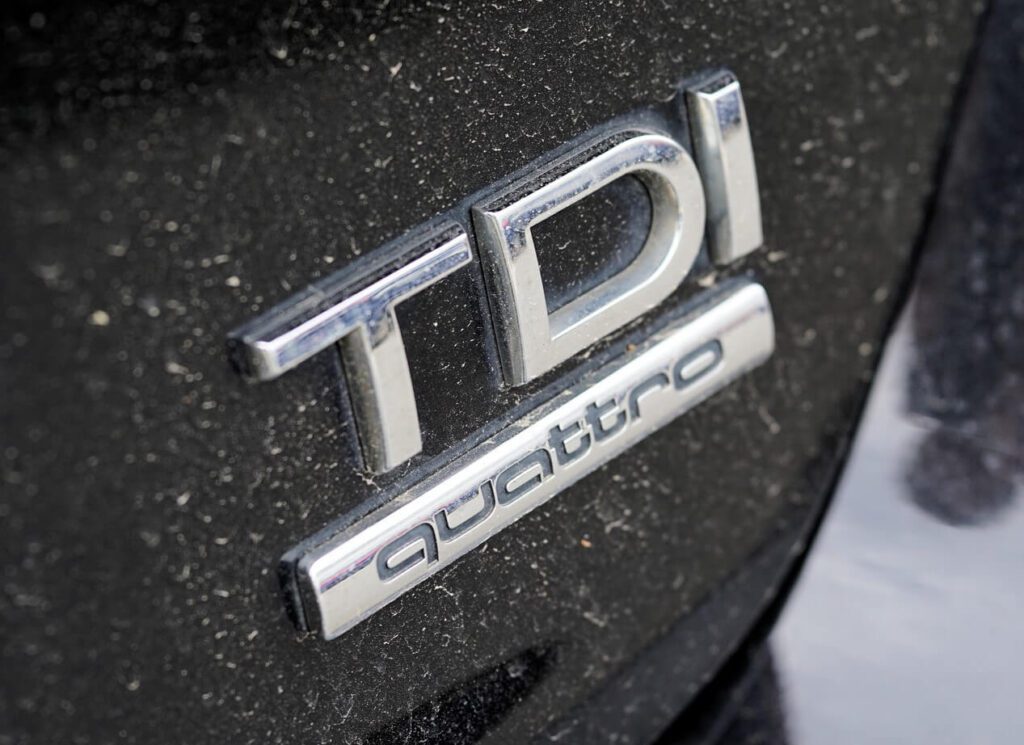
How to Reduce Black Smoke in Diesel Engines?
Looking after your car is the best way to reduce black smoke from a diesel engine. The other point is that diesel engine cars are designed to be driven. Driving a few hundred yards to the shop and back is not doing a diesel engine any good. Some other things you can d contribute to running a cleaner diesel engine are:
- Regularly service the vehicle including changing the air filter.
- Occasionally use diesel fuel treatments that target cleaning fuel injectors.
- Drive the car for more than 30 minutes at least once a week to encourage a DPF regen (where applicable).
- Use good quality diesel fuels.
Is It Safe to Drive?
Depending on the cause of the problem, it may be safe to drive to a point; the problem with driving with a diesel engine kicking out lots of black smoke is if the cause is something like a piston ring or blown turbo, you are going to be causing much more damage than good.
However, if the problem is the DPF requires a regen, then the car needs to drive usually at a fast speed in a lower gear to encourage the regen. As you drive, the vehicle may intermittently spit out more large plumes of black smoke while it regens. It is perfectly safe to drive in this case. But this all assumes you know exactly what this issue is first.
Final Thoughts
To finish, black smoke from a diesel engine when accelerating is not normal and should not be ignored. Diesel gives off black smoke when burnt, so you can expect a small amount if the engine is a bit older, just from wear and tear, but excessive black smoke indicates a problem. The first place to check is either the air filter or the condition of the turbocharger, as black smoke means the car is not receiving enough air or too much fuel.
